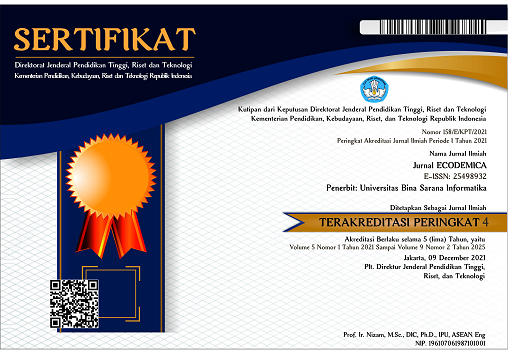The Effect of Perceived Relative Advantage and E-Commerce Knowledge on The Behavior of Doing Online Business Among Undergraduate Students in Indonesia
Abstract
Online business endeavors have already become popular due to technological advancements. Many young people engage in online business due to its flexible nature and their technological proficiency. This study investigates the influencing elements in decision-making among young individuals engaging in online business. The results of the study serve as a valuable reference for understanding the crucial factors that drive online business activities among the younger generation. This quantitative study utilizes distributed surveys via Google Forms with 102 respondents. It used the Partial Least Squares Structural Equation Modeling (PLS-SEM) data analysis technique. The results indicate that Perceived Relative Advantage (PRA) significantly influences E-commerce Knowledge (KNOW), which in turn positively influences Actual Action in Doing Online Business (ACTION). Additionally, E-commerce Knowledge (KNOW) mediates the relationship between Perceived Relative Advantage (PRA) and Actual Action in Doing Online Business (ACTION).
Keywords
Full Text:
PDFReferences
Agag, G., & El-Masry, A. A. (2016). Understanding consumer intention to participate in online travel community and effects on consumer intention to purchase travel online and WOM: An integration of innovation diffusion theory and TAM with trust. Computers in Human Behavior, 60, 97-111. doi:10.1016/j.chb.2016.02.038
Al-Tit, A. A. (2020). E-Commerce Drivers and Barriers and Their Impact on E-Customer Loyalty in Small and Medium-Sized Enterprises (SMSE). Business: Theory and Practice, 146–157. doi:10.3846/btp.2020.11612
Cao, X., & Mokhtarian, P.L. (2005). The intended and actual adoption of online purchasing: A brief review of recent literature. St. Louis: Federal Reserve Bank of St. Louis. Tratto da https://www.proquest.com/working-papers/intended-actual-adoption-online-purchasing-brief/docview/1698394293/se-2
Davis. (1989). Perceived Usefulness, Perceived Ease of Use, and User Acceptance of Information Technology. MIS Quarterly, 13 (5), 319-339.
Desi, MS, & Sri, S. (2018). Price, product quality, and promotion on mobile customer satisfaction. Journal of the Faculty of Economics, Dr Soetomo University, 27 (3), 109–119. Tratto da https://ejournal.unitomo.ac.id/index.php/fe/article/view/2971/1250
Deventer, M. v., Klerk, N. d., & Bevan-Dye, A. (2018). Influence of Perceived Ease of Use and Perceived Relative Advantage on Generation Y Students’ Attitudes Towards and Usage Behaviour of Mobile Banking in South Africa. International Journal of E Business and E Government Studies, 10(1), 18-33.
Ellitan, L., & Prayogo, C. (2022). Increasing online Purchase through Perceived Usefulness, Perceived Risk and Perceived Ease of Use. Jurnal Ekonomi, Manajemen, Akuntansi, 1(2), 261-2070.
Gengatharen, D.E. (2008). Interpreting the success and failure of regional internet community portals in promoting e‐commerce adoption by SMEs : A cultural perspective. Journal of Systems and Information Technology, 10(1), 56-71. doi:10.1108/13287260810876894
Hossain, Al-Hanakta, Hervie, Nor, & Illes. (2022). Exploring the Key Success Factors for Sustainable E-Commerce Adoption in SMEs. Polish Journal of Management Studies, 25(1), 162-178. doi:10.17512/pjms.2022.25.1.10
Iriani, S. S., & Andjarwati, A. L. (2020). Analysis of Perceived Usefulness, Perceived Ease of Use, and Perceived Risk Toward Online Shopping in The Era of Covid-19 Pandemic. Sys Rev Pharm, 11(12), 313-320.
Lee, J. S., & Hsieh, J. C. (2019). Affective variables and willingness to communicate of EFL learners in in-class, out-of-class, and digital contexts. System, 82, 63-73. doi:10.1016/j.system.2019.03.002
Li, S.S., & Karahanna, E. (2015). Online Recommendation Systems in a B2C E-Commerce Context: A Review and Future Directions. Journal of the Association for Information Systems, 16 (2), 73-107. doi:10.17705/1jais.00389
Mawarni, AR, Riswan, Triatmaja, MF, & Hidayah, R. (2023). The Influence of Financial Technology, E-Commerce, Financial Literacy and Use of Accounting Information Systems on the Performance of MSMEs in Batang Regency with Accounting Knowledge as a Moderating Variable. Journal of Balance Sheets, 19 (2), 29-47.
Meghisan-Toma, G.-M., Puiu, S., Florea, N.M., Meghisan, F., & Doran, D. (2021). Generation Z' Young Adults and M-Commerce Use in Romania. Journal of Theoretical and Applied Electronic Commerce Research, 16 (5), 1458–1471. doi:10.3390/jtaer16050082
Meghisan-Toma, G.-M.; Puiu, S.; Florea, N.M.; Meghisan, F.; Doran, D. (2021). Generation Z’ Young Adults and M-Commerce Use in Romania. J. Theor. Appl. Electron. Commer. Res., 1458-1471. doi:10.3390/jtaer16050082
Meidawati, N., Yunitasari, F., & Puspita, O. D. (2022). Effect of promotion, perceived usefulness, and perceived ease of use on interest in adopting e-wallet (ovo and dana). International Journal of Research in Business and Social Science, 11(8), 191-201. doi:10.20525/ijrbs.v11i8.2060
Meidawati, N., Yunitasari, F., & Puspita, O. D. (2022). Effect of promotion, perceived usefulness, and perceived ease of use on interest in adopting e-wallet (Ovo And Dana). Research in Business & Social Science, 11(8), 191-201. doi:10.20525/ijrbs.v11i8.2060
Mende, M., Thompson, S. A., & Coenen, C. (2015). It’s all relative: how customer-perceived competitive advantage influences referral intentions. Mark Lett, 26, 661–678.
Mende, M., Thompson, S. A., & Coenen, C. (2015). It's all relative: How customer-perceived competitive advantage influences referral intentions. Marketing Letters, 26(4), 661-678. doi:10.1007/s11002-014-9318-x
Nasution, M.D.T.P., Rafiki, A., Lubis, A. and Rossanty, Y. (2021). Entrepreneurial orientation, knowledge management, dynamic capabilities towards e-commerce adoption of SMEs in Indonesia. Journal of Science and Technology Policy Management, 12(2), 256-282. doi:10.1108/JSTPM-03-2020-0060
Paramita, D. A., & Hidayat, A. (2023). The effect of perceived ease of use, perceived usefulness, and perceived benefits on interest in using bank syariah indonesia mobile banking. International Journal of Research in Business and Social Science, 12(5), 1-9. doi:10.20525/ijrbs.v12i5.2643
Paramita, D. A., & Hidayat, A. (2023). The effect of perceived ease of use, perceived usefulness, and perceived benefits on interest in using bank Syariah Indonesia mobile banking. International Journal of Research in Business and Social Science, 12(5), 1-9. doi:10.20525/ijrbs.v12i5.2643
Permana, R. A., & Astuti, B. (2023). Pengaruh Review Beauty Influencer Terhadap Niat Beli Produk Pada Media Sosial YouTube. Jurnal Inovasi Bisnis dan Manajemen Indonesia, 6(3), 290-304.
Ramayah, T., & Malhotra, P. (2007). The role of perceived usefulness, perceived ease of use, perceived credibility, perceived behavioral control and subjective norm on intention to use internet banking. International Journal of Technology, Knowledge and Society, 2(6), 83-90. doi:10.18848/1832-3669/CGP/v02i06/55649
Sina, K. Y., Osmanb, A., Salahuddinc, S. N., Abdullaha, S., Limd, Y. J., & Sima, C. L. (2016). Relative Advantage and Competitive Pressure towards Implementation of E-commerce: Overview of Small and Medium Enterprises (SMEs). Procedia Economics and Finance, 434 – 443. doi:10.1016/S2212-5671(16)00054-X
Slyke, C. V., Johnson, R. D., Hightower, R., & Elgarah, W. (2008). Implications of researcher assumptions about perceived relative advantage and compatibility. Database for Advances in Information Systems, 39(2), 50-65. Tratto da https://www.proquest.com/trade-journals/implications-researcher-assumptions-about/docview/196640649/se-2
Slyke, C. V., Lou, H., Belanger, F., & Sridhar, V. (2010). The Influence of Culture on Consumer-Oriented Electronic Commerce Adoption. Journal of Electronic Commerce Research, 11(1), 30-40.
Smith, J. R., Terry, D. J., Manstead, A. S. R., Louis, W. R., Kotterman, D., & Wolfs, J. (2008). The attitude-behavior relationship in consumer conduct: The role of norms, past behavior, and self-identity. The Journal of Social Psychology, 148(3), 311-333. doi:10.3200/SOCP.148.3.311-334
Smith, J. R., Terry, D. J., Manstead, A. S., Louis, W. R., & Kotterman, D. (2008). The Attitude–Behavior Relationship in Consumer Conduct: The Role of Norms, Past Behavior, and Self-Identity. The Journal of Social Psychology, 143(3), 311–333.
Song, X., Huang, F. and Li, X. (2017). The Effect of Embarrassment on Preferences for Brand Conspicuousness: The Roles of Self-Esteem and Self-Brand Connection. Journal of Consumer Psychology, 27, 69-83. doi:10.1016/j.jcps.2016.05.001
Triandewo, M. A., & Sagy, K. (2021). The Impact of Perceived Benefits, Perceived Web Quality and Trust on Attitude Towards Online Shopping on Female Consumer Who Use Shopee Application in Jakarta. International Journal of Business, Economics and Law, 24(3), 33-43.
Van Slyke, C., Lou, H., Belanger, F., & Sridhar, V. (2010). The Influence of Culture on Consumer Oriented Elecronic Commerce Adoption. Journal of Electronic Commerce Research, 11(1), 30-40. Tratto da https://www.proquest.com/scholarly-journals/influence-culture-on-consumer-oriented-electronic/docview/236665203/se-2
Venkatesh, V., & Davis, F. (2000). A Theoretical Extension of the Technology Acceptance Model: Four Longitudinal Field Studies. Management Science, 46, 186-204. doi:10.1287/mnsc.46.2.186.11926
Wang, E. S.-T. (2022). Influences of Innovation Attributes on Value Perceptions and Usage Intentions of Mobile Payment. Journal of Electronic Commerce Research, 23(1), 45-58.
Waring, M. E., Blackman Carr, L.,T., & Heersping, G. E. (2023). Social media use among parents and women of childbearing age in the US. Preventing Chronic Disease. doi:10.5888/pcd20.220194
Waring, M. E., Carr, L. T., & Heersping, G. E. (2023). Social Media Use Among Parents and Women of Childbearing Age in the US. Preventing Chronic Disease, 20, 1-5. doi:10.5888/pcd20.220194
Wulandari, S., Keni, K., & Ping, T. A. (2023). Pengaruh Relative Advantage dan Perceived Ease of Use Terhadap Attitude dengan Trust sebagai Variabel Mediasi. Jurnal Muara Ilmu Ekonomi dan Bisnis, 17(1), 68-79. doi:10.24912/jmieb.v7i1.21228
Zain, Z. M., Jusoh, A. A., & Ros Intan Safinaz Munir, L. P. (2020). Drivers of E-Commerce Adoption amongst Small & Medium Sized Enterprises (SMEs) in the Business Service Sector. Journal of International Business, Economics and Entrepreneurship, 5(1), 50-58.
DOI: https://doi.org/10.31294/eco.v8i1.21639
Copyright (c) 2024 Rosdiana Sijabat

This work is licensed under a Creative Commons Attribution-ShareAlike 4.0 International License.
ISSN: 2355-0295 || E-ISSN: 2549-8932
-----------------------
Indexed by:
dipublikasikan oleh LPPM Universitas Bina Sarana Informatika dengan dukungan Relawan Jurnal Indonesia
Jl. Kramat Raya No.98, Kwitang, Kec. Senen, Kota Jakarta Pusat, DKI Jakarta 10450

This work is licensed under a Creative Commons Attribution-ShareAlike 4.0 International License








